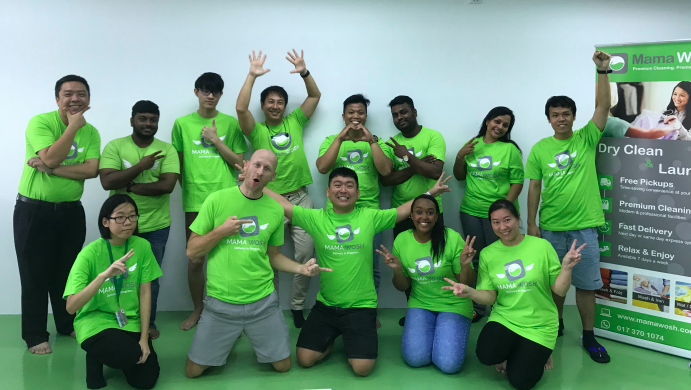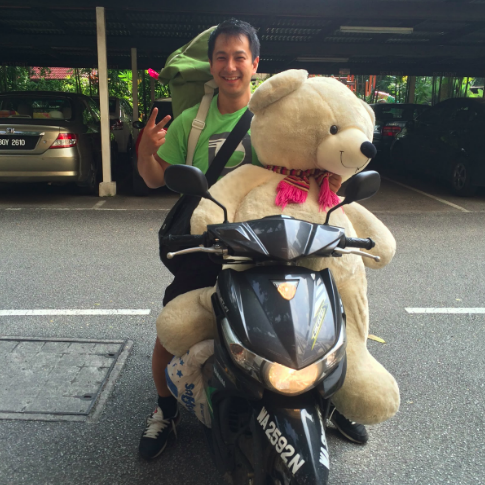Angel-funded on-demand laundry startup Mama Wosh is already gaining good traction in Kuala Lumpur

Mama Wosh team with Co-founders Anh Tu Sam (fourth from left, on the back row) and Holm Schimanski (second from left on the front row)
(Here is an article from our archives which we think is still relevant)
Just a few weeks after Anh Tu Sam’s birth to a Vietnamese mother and a Chinese-descent father in the city of Hanoi, his country plunged into a massive political unrest, forcing them to flee Vietnam. After several months of a perilous journey on a country boat, with a temporary stop in Hong Kong, Anh Tu Sam and his family ended up in the German city of Dortmund in 1980.
“We first arrived in a refugee camp near Dortmund,” Sam recounts the treacherous journey to e27. “Since then, we moved around many times and lived in places like Hamburg, Cologne, Bonn and Frankfurt. The first few months were hard, as I could not pick even a single word of the German language. This made my kindergarten tough. However, after several months of perseverance, I assimilated into the local culture and lifestyle.
“From then on, I enjoyed each and every moment of my life spent there. However, I always felt something amiss in my life. I realised that it was the yearning to return to my roots, meaning to go back to Asia. That’s what brought me back. I feel that it is my destiny to be here,” he shares.
Meeting future co-founder
While pursuing a Graduate course in Business Computing at a university in the European country, Sam met Holm Schimanski. Although they came from different backgrounds, they both shared some common characteristics and became thick friends. After graduation, Sam worked for a leading strategy consulting company and opened several F&B franchise stores, before eventually founding a VC-funded language startup. Schimanski, on the other hand, worked as an IT consultant for over a decade, dealing with large customers and implementing CRM and SAP software.
“It was 2015 and the O2O category was slowly taking off across the world, thanks to the success of companies like Uber and Grab,” Sam, now 39, shares. “We decided to try our luck on O2O. We sat together and brainstormed ideas around this. I was still itching to go back to Asia. Fortunately, Schimanski (now 38) was also okay with my idea as he, like me, always loved the Southeast Asian lifestyle.”
Also Read: eziPOD’s smart laundry locker doubles as your courier delivery point and personal storage
However, with the kind of economic growth rates in Asia, it was a no-brainer to set up a business in this part of the world, Sam thought to himself. “We conducted an in-depth research of all major ASEAN markets, such as Singapore, Thailand, Indonesia, Vietnam and the Philippines. After looking into GDP levels, disposable incomes, infrastructure, language barriers, market size etc., Malaysia seemed like the perfect starting point.
And the duo set foot in Malaysia, with an on-demand laundry startup.
Launched in Selangor in 2015, Mama Wosh is a laundry subscription service app. As customer, you can choose your time and location, and Mama Wosh’s “laundry angels” will come and pick the laundry. You will get back your clothes folded or ironed within a specified timeframe.
“Most people are frustrated with laundry and dry cleaning in general,” according to Sam. “Consumers spend 12-15 hours on laundry every month. Most laundromats and dry cleaners have limited business hours only. Bad cleaning, damaged and lost items are the most frequent complaints. Transparency in pricing is another problem. We are here to address these pressing issues.”
The Malaysian on-demand laundry segment is still in the nascent stages, despite the fact that there are already a handful of companies attacking different sections of the society. “We have seen a lot of laundry startups in Malaysia. Most came, stayed for a few months or a year, and then went offline again. Probably because they have underestimated the operational complexity of this business model,” Sam notes.

Mama Wosh Co-founder and CEO Anh Tu Sam
Most laundry businesses in the country are just mom-and-pop shops that have spent some money on a website and started to deliver to their existing customer base. Sam feels that these businesses know literally nothing about tech, online or digital. “We have also noticed that Asians in general are embracing mobile technologies much more than Germans. Back in our home country, we would have to deal a lot with legal and privacy issues such as the GDPR compliance. Here in Malaysia, the government is very eager in becoming a prospering digital economy. And we love it.”
Then there are coin laundromats which, in his view, are great for low income households, but for majority of the population, sitting around and waiting for an hour or more just to do your laundry seems like a very inconvenient waste of time.
The existence of the number of players such as eziPOD, Fresh Press, Mr. White Dry and Mobile Laundry, however, doesn’t really bother Sam and team. “We are looking at competition from two different angles. One the one hand, like Peter Thiel or the book Blue Ocean Strategy says, you don’t want to have competition; ideally you are the only dominant player and run a monopoly. At the same time, competition can be a good thing as it fuels innovation, which in turn will benefit the end customer. In the end, we said to ourselves: several players in the market are a good indicator that there’s some demand. Let’s bring on the challenge and crush the competition, which we eventually did,” he shares.
Indeed, everything in Malaysia is still in its infancy, Sam reveals. Search Engine Optimisation, affiliate marketing, digital analytics, email marketing, frontend/backend engineering– it’s tough to find talent with decent experience in those domains. “But we’re quite happy about it. What this means is that the situation gives us some advantage and a headstart over our competitors,” Sam smiles.
The revenue stream
In order to earn revenues, Mama Wosh banks on three services — laundry wash, dry cleaning and curtains. With its curtain PLUS service, the startup sends a team of people to do the heavy lifting for the customer. This means, these people remove, wash and re-install the curtains for the customer.

For the other two services, the startup enables customers to choose between regular turnaround time or next-day express turnaround at double the normal rates. In the beginning, Mama Wosh banked on a ‘pay-per-use’ model; if a customer had three loads of laundry in a month, he/she would make three bookings, get three deliveries and pay three bills.
“But, always having the customer and his problems in mind, we thought ‘how we can make their lives easier?’ That’s when we came up with the ‘Laundry-as -a-Service’ concept. It’s a subscription model where you pay a monthly flat fee and are entitled to have one laundry pickup every week. We would pick up the bag, and whatever you can fit into this bag gets washed, dried and folded,” he explains.
Still in beta test mode, Mama Wosh is going to publicly launch the service soon.
In Sam’s opinion, the Malaysian market is not the biggest, and the company plans to expand to another country within the next 12 to 18 months. Whether it’s going to be Singapore or Thailand remains to be seen, he said. “There is no rush — in Malaysia alone, there’s enough business to make millions of dollars per month.”
A massive market
As per the company’s estimates, the laundry market in Southeast Asia is growing at a CAGR of 37 per cent and is estimated to reach US$1 billion in annual sales in 10 years from now. The market share of traditional players will steadily decline but offline retail will never go away. “Luckily, we have figured out how to fill out those gaps and have a strong physical offline presence.”
Looking into the future, Sam wants to shape an entirely new O2O category at a massive scale. He says popular apps like Grab and Go-jek started with transportation, then later ventured into other verticals, such as food, payments, parcels.
“One day, they will have to deal with the laundry vertical. Given the massive market size, they cannot simply ignore laundry and sit on their transportation or food delivery cash cows forever,” he feels.
In the first two years of launching the company, Sam and Schimanski were doing freelance consulting jobs to bootstrap and finance Mama Wosh. “Last year a fantastic business angel joined our company and invested a small amount. Now that we have seen great traction over the past 12 months, we committed ourselves to work full time on Mama Wosh, and make this really big. We want to take our startup to the next level and hence looking for a seed round of US$350,000,” he concludes.
—-
The post A refugee in Germany in the 80’s, this entrepreneur is now back in Southeast Asia to achieve his dreams appeared first on e27.